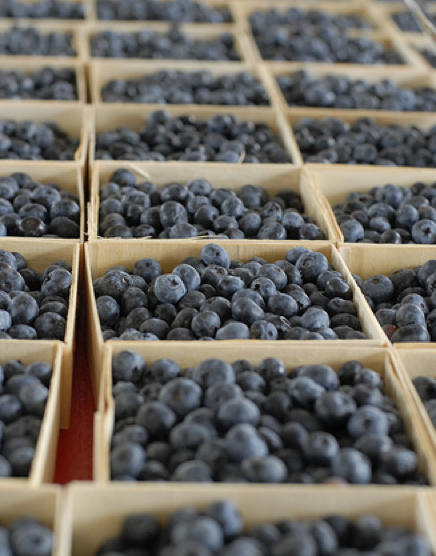A recent story on National Pubic Radio (NPR) entitled Wal-Mart Helps Small Farms Supply Local Food got me thinking. On the surface, the idea of Wal-Mart -- or any retailer, big or small -- making a public commitment to sourcing better food strikes me as a positive thing. According to the article:
The company wants to revitalize small and midsize farms in the U.S. and has begun a program to increase the amount of local produce sold in Walmart stores. The program also benefits consumers, who have access to fresher food, as well as Wal-Mart itself.
That sounds pretty good, right? The article goes on to say that:
[Farmer Randy] Clanton says Wal-Mart has helped make his operation more professional, especially in the area of food safety. Wal-Mart has urged Clanton to diversify and plant watermelons, peppers and cabbage. Now he supplies food to distribution centers covering six states. And the larger market means Clanton makes more money.
"It gives us a sense of security whenever we go out here and start kicking the dirt out here and cranking up ole John Deeres up to get ready," he says. "If you know you've got a market out there — that gives you a reason to get up out of bed every morning."
Clanton is one of about 350 farmers Wal-Mart is working with as part of its Heritage Agriculture program.
More money? 350 farmers? A market ready to buy fresh, local foods? That sounds terrific. But when I checked in with a few of my local farmer friends to get their point of view, they weren't so sure. Eric Klein from Hidden Stream Farm put it this way:
"While the initial thoughts and opportunities could be great, we must first step back and look at who we are dealing with. Yes, Wal-Mart has the ability to purchase in quantity and if they are willing to purchase at a reasonable price they could even give a lot of farms that push that they need for profitability. But this is the same company that comes into small communities and in a single blow upsets the entire local economy.
"Let's continue to remember who we are, and what we hope is the future of agriculture in years to come. It would be great to see more and more land get transitioned to organic/sustainable and away from GMO/Anhydrous ammonia. And perhaps the American consumer will do 100% of their shopping at either their local farmers' market, local food coop, or farm direct."
I can't say I was surprised that Eric, a committed local farmer, is distrustful of big business co-opting a movement that he's helped build with years of hard work and vaues-driven commitment. But is it reasonable to think that most American consumers will one day do 100 percent (or even 50 percent? 25 percent?) of our shopping at farmers markets, co-ops, or directly from farms? If we want the local food industry to grow, don't we need businesses like Wal-Mart to stock local food so that most Americans can buy it?
 Photo credit: Kate NG SommersIn his excellent 2006 book The Small-Mart Revolution, Michael Shuman argues that local businesses make better decisions with more meaningful impacts on their communities than their big-box counterparts. He questions the motives of big businesses claiming to support anything local, including food, saying:
Photo credit: Kate NG SommersIn his excellent 2006 book The Small-Mart Revolution, Michael Shuman argues that local businesses make better decisions with more meaningful impacts on their communities than their big-box counterparts. He questions the motives of big businesses claiming to support anything local, including food, saying:
A recent ten-state survey by the Leopold Center for Sustainable Agriculture found that when given a half-dozen premium features for fresh produce and meats, the number one choice -- by 75 percent of consumers and 55 percent of food business proprietors -- was "grown locally by family farmers" [...] Even Wal-Mart now feels duty-bound to mention a few community-friendly deeds in its marketing campaigns.
Many of us recognize that this approach is just good marketing, and not worth losing sleep over. We don't spend time questioning the intentions of large companies getting into the local food space, we just assume they're greenwashing their brand in an attempt to sell more product.
And yet, the question remains: are we better off with more local food being sold at more affordable prices in more accessible locations, or aren't we? The answer is not as simple as we might hope. Let's break it down.
Are we better off with more local food being sold, period?
This question seems to be fairly straightforward. Yes, let's assume we're better off with more people purchasing -- and consuming -- more fresh food, grown sustainably in their own communities. Local food is healthier, has a less-adverse impact on our environment, and supports local economies: win, win, win.
Are we better off with good food being made more affordable?
At the risk of supporting the idea that good food is more expensive than bad food (an argument that ignores the true cost of cheap food to our health and our environment), the answer to this question depends on why the food is more affordable. If the food is more affordable because we're finding ways to subsidize vegetables rather than cattle feed, that's a good thing. If the food is more affordable because the people who are growing, picking, butchering, and packaging it are not being paid or because the animals are kept in confined spaces, I'd rather just go ahead and pay a little bit more.
We are what we eat -- physically and spiritually.
Are we better off with good food being sold in more accessible locations?
This is the most interesting -- and complicated -- question to me, because it hinges on the value of relationships and trust. Many of us have heard stories of farmers growing a particular food for a particular vendor, only to have that vendor select a different supplier at the last minute to save a nickel. Some of us personally know farmers who had planned to sell their entire crop to a large retailer, only to have it destroyed by a fire or a flood. These situations are devastating to farmers, and can easily put them out of business.
A local farmer who sells directly to restaurants, co-ops, or CSA/farm share members has a business based on meaningful relationships, mutual understanding, and shared values. When a crop doesn't come in, a fire burns down the barn, the lettuce bolts, or hail rains down, the local farmer relies on his community for support, understanding, and, at times, money. A farmer who sells directly to local-food restaurants is not afraid that his prices will be undercut, or that the restaurant will suddenly change the menu and drop him as a vendor; he has cultivated a crop he knows the chef will buy, and that trust forms the basis of a sustainable business.
A farmer who sells to a larger company may sell more food quickly, but will likely be in a position of constantly having to compete on price with every other nameless, faceless farmer out there. His fast-growing business is constantly at risk.
What are we supposed to do?
Let's assume that the goal of most product-focused businesses -- from big-box retailers to local farmers -- is to sell lots of things. If this is true, then when customers demand local, organic, sustainable, green, healthy, fresh food, the farmers will grow it and the grocers will stock it. When customers change their minds, they'll stop. You've heard parents use the phrase (in jest, I hope) "I brought you into this world, and I can take you out of it"? The same is true of big box retailers, and we should not assume that they will feel compelled to support local growers if consumer whims change.
Maybe this is a good thing. In a capitalist society, can we reasonably expect a company to do things that hurt its bottom line?
And yet, in the case of our food system, I wonder if this system has done more harm than good. Is cheap food what we should be aiming for? Should we be rewarding businesses that increase access while making it impossible for the farmers who grow our food to make a living? And what of the busineses whose goal is not simply to "sell lots of things," but to increase the consumption of the right things?
Here's what I think:
As a consumer, I want to be able to find more good food at more accessible places. When I can't make it to the co-op or farmers' market, I am very happy to see local and organic produce at the corner store. Selfishly, I hope they continue to stock good food because it helps me in a pinch.
As a good food evangelist, I want good food to be accessible everywhere, at prices that everyone can afford. I want every corner store, farmers' market, big-box retailer, and co-op to stock good food. I want people to consider carrots instead of sugary cereal every time they make a food choice.
But if I were a farmer, I'd think very hard about making a deal with a company that was based on their own best interests, not mine. I'd diversify my crop and I'd diversify my customer base, and, if I could, I might resist the urge to accelerate the growth of my farm to meet a single customer's need. There's a much better chance of becoming the next farm for sale than the next Stonyfield Organic.
But, I'm not a farmer, and I'm only one of thousands of good-food evangelists, one of millions of good-food consumers. What do you think? What happens when big businesses sell local food? What does it mean to farmers, communities, relationships, and food systems? Let's help each other figure it out.

Lee Zukor is the founder of Simple, Good, and Tasty. E-mail him at lee@simplegoodandtasty.com or follow him on Twitter.




